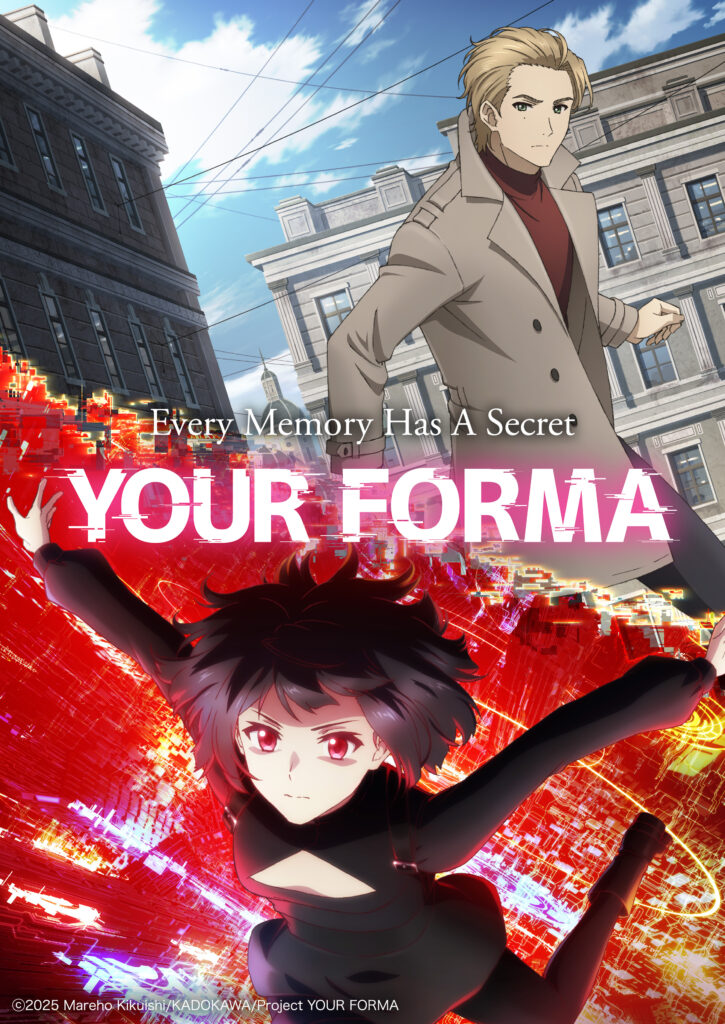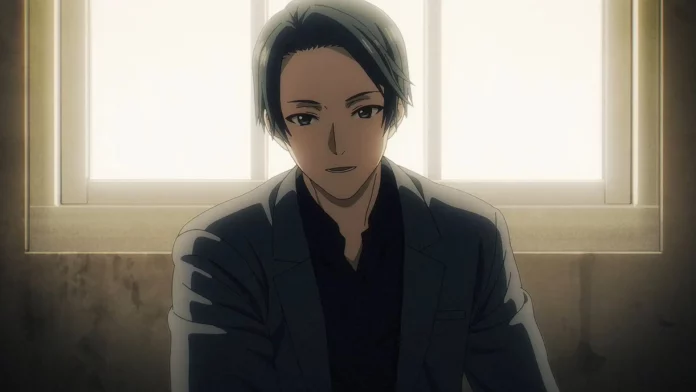Kensho Ono and Jun Fukuyama both agree that YOUR FORMA is gripping because it mirrors contemporary life. With AI becoming more advanced, the story’s core questions, like whether humans and machines can truly bond feel more relevant than ever. While the premise of a human-robot detective duo isn’t new, the actors emphasize how global events, including the pandemic and the rise of generative AI, have given these themes new emotional weight.
To mark the release of Episode 9 of YOUR FORMA, we had the pleasure of speaking with Kensho Ono and Jun Fukuyama. Exclusive interviews with the cast and creative team are being published on AnimeTV after episodes 1, 4, 6, 8, 9, and 13.
Official Trailer:
To start off, could the two of you tell us what you both think makes Your Forma such an intriguing series?
Kensho Ono: In the world we live in, AI is becoming more advanced and integrated into our lives by the day, so even just from the start of Episode 1, the story of Your Forma feels quite realistic. This series poses questions like, “Can humans and robots grow close?” and “How would they interact during their daily lives?” so it’s the kind of anime that really makes you think.
Jun Fukuyama: The premise of “A human and a robot partner team up to solve crimes” is not a new one of course, but after experiencing a global pandemic and AI becoming a hot topic over the past few years, this kind of story feels fresher and more compelling.
Could you both please share the impression you have of your respective characters, Harold and Sozon?
Kensho Ono: Harold is a special model of Amicus, but rather than being indistinguishable from humans, one could say he is consciously more human in terms of his thought process and reactions. I don’t have much experience with playing robots, so when I was given directions, they said, “Pretend you’re consciously thinking, ‘Ah, this is how a human should act.’” I think that makes Harold come off as charming, rather than unsettling. Also, he’s got this flirty, gentlemanly side of him that you don’t often see in Japanese characters, further adding to his appeal. Amidst all of that, the feelings he hides regarding the Sozon Incident make him a much deeper character than he first appears, and I think that makes him quite likable.
Jun Fukuyama: Sozon is Harold’s opposite. Amongst the Amicus, Harold is a special model who can act more human than anyone, but Sozon, compared to his fellow department members, is the kind of guy that doesn’t know how to “live properly.” I mean, he does fine in his private life, so I wouldn’t say he’s exactly defective or anything, but I think he’s just the type who hates when society tells him what he “should” do. So, in the bad sense, Sozon has the stink of humanity all over him.
From my point of view, Harold has a very human side, like Ono said, and I feel like he strikes an emotional chord with Sozon. When they’re in the car there’s a scene where he says, “I didn’t say you should turn into a sleezy Amicus,” but I’m sure that from Sozon’s point of view, he feels like he wants to guide Harold as his partner. Sozon’s more of a lone wolf type who began to think, “Well, since I found some great material, I might as well try to make something good out of it.” (laughs).
Kensho Ono: I think when Sozon first met Harold he thought, “This guy is pretty useful.” He can record everything he sees, use data freely, and he operates like a genius too. I think he also probably had the feeling of, “I found a partner who’s on the same level as me.”
From how I see it, Sozon is the most human. And if you ask me, the voice behind Harold, even though I played this android as incredibly human, Sozon struggling with relationships makes him feel far more human than Harold.
Ono-san, what kind of impression do you have of Harold’s current partner Echika?
Kensho Ono: That she’s even more difficult person than Harold (laughs). I think that Echika’s existence is actually what made Harold awaken to his more human feelings. Even though they both treasure each other, their relationship goes somewhat off the rails and takes a negative turn, which often happens with Echika, leading her to wonder, “Why can’t we make it work even though we both care about each other?” As the series progresses, the role that Echika plays in Harold’s life grows much bigger.
Were there any special points you paid attention to while voice acting during Episode 9?
Jun Fukuyama: Episode 9 was kind of an origin story, so what I focused on most was how to portray that contrast between the duo of Sozon and Harold and the duo of Harold and Echika. I also wanted to highlight the contrast of Harold as a concept, an android who one could argue is more human than most actual humans. Within the episode’s dynamic, I thought about how I wanted to approach Sozon’s role in the story, how Ono’s performance could shape my own voice acting, and how Sozon should come across to the audience. I talked it over with Director Ozaki and the rest of the team as we characterized him together.
Kensho Ono: Up through Episode 8, Harold is without fault, a sociable, humanlike Amicus, who easily grows close to people. Episode 9 quickly flies through his time with Sozon, so I tried to focus on showing the passage of time in my performance. I really wanted to show how their relationship gradually shifts as they get to know each other better. Also, when Harold, Steve, and Marvin all appeared on screen at the same time… I was secretly a bit nervous! (laughs).
Jun Fukuyama: Ah yes, you had to perform all three of their voices at once, right? Watching you do that was so interesting (laughs). Also, on a personal note, the studio where we worked on Your Forma was the same one from the first time I worked with Kensho. That made me feel like, “Time sure is a funny thing.”
Kensho Ono: That really was already 17 years ago, huh? I remember the last round of recording back then was the day of my high school graduation.
Jun Fukuyama: Seriously!?
Kensho Ono: I also had some personal feelings about this recording. Working on Episode 9 felt a lot like when we were working on Episode 1. The environment of Your Forma changes with every new incident, and recording for it always feels tense, but Episode 9 in particular stood out with its cast of characters, Harold’s personal circumstances, and how much he’s changed. It really felt refreshing to record that episode.
Was there any one scene from Episode 9 that left an impression on you?
Jun Fukuyama: Well, definitely the scene where Sozon is murdered. These days I feel like there’s not a lot of series with scenes like that in it. It’s not unusual for even a murder scene like this to receive direction along the lines of, “Please act like it doesn’t hurt much, or the viewers will get scared.” With that understanding, I am really grateful that for this performance I was allowed to incorporate the fear of pain and suffering, which I think helped make the acting much better.
Kensho Ono: That scene also left a deep impression on me. I thought a lot about what Harold must’ve been thinking about, watching that horror play out before his eyes. It’s actually really difficult to play Harold, because I have to “not let my emotions linger” so to speak.
If Harold were a real human, then all those complicated emotions would linger and weigh him down, but that isn’t the case for him. I think that is what separates him from humans the most. And concerning that, the part of the episode I paid the most attention to was how Harold would conduct himself after witnessing such a violent scene. And all things considered, the classical music playing in that scene sure does seem like it would become a major trauma…
Jun Fukuyama: Seriously. But I think it was important to not skimp on the horror while depicting that scene. I want a lot of people to watch it, but I really do think there are some things you have to show without trying to tone it down.
Kensho Ono: I agree. I feel like I understood what the writers were thinking.
Jun Fukuyama: Also, when I recorded the line, “Let’s go home, Harold,” the staff told me, “This line will appear several more times, so good luck with the recording,” and that put a weird kind of pressure on me, which also left an impression (laughs).
You can really feel how Harold has grown since meeting Sozon, but could you two share a story each from your time working as voice actors where you really felt that you had grown?
Jun Fukuyama: Growth is a difficult thing…I entered this industry at the age of 18, but I can generally still do voices for the roles I’ve done since turning 20 in the same way as I always did. However, I can’t reproduce how my voice sounded in my teens. I had no technique then, I was just voicing the character as myself, and that kind of inexperienced way of voice acting is not something you can recreate. Looking back, I feel like that was a very precious time to me. I think gaining technique and experience in this field is proof of my growth as a voice actor, but it also feels like I’ve lost something at the same time.
Kensho Ono: I feel that too. I constantly worry like, “What should I do here?” so I have no real sense of personal growth. Of course, I do think I’ve grown as a voice actor, but at my current age it feels less like “growth” and more like “change.”
Jun Fukuyama: But you know, I myself feel like I’ve also had a surprising change in perspective. When I was around your age, my style of acting changed significantly, and work started becoming much more interesting.
And how did that change?
Jun Fukuyama: I was more hardheaded when I was young. I was very stuck in how I wanted things like, “I’m definitely doing this scene this way!” But I’ve come to be more of the “go with the flow” type now. Or rather, you could say I’ve been striving to be a more flexible person.
Kensho Ono: I see. When you put it that way, I think I may feel the opposite from Fukuyama-san. I’ve never been a rigid person, so as a result now I am struggling with that.
Jun Fukuyama: I think depending on how someone gets into the world of voice work, that way we consider these things changes. For example, you started out as a child actor, not just a voice actor, so you also worked on stage and in front of a camera. Of course, that would mean what was required of you them was different from someone who started out in voice work. However, when it comes to what is necessary to continue working in this field, I don’t think that part is so different in the end.
Kensho Ono: I think you’re right there. I feel like this worry is probably the everlasting type. I can see the appeal of other actors, but I have no clue how to have a good relationship with my own work. I feel like all I can do is take it one step at a time to learn how to.
By the way, if you two could dive into someone’s memories like Echika, whose memories would you want to see?
Kensho Ono: I definitely wouldn’t want to dive into the memories of anyone I know. I’m pretty sure there are things they wouldn’t want me to find out about. So, I think if I were to dive into someone, a historical figure would be a good candidate.
Jun Fukuyama: Like who?
Kensho Ono: Hmm, Oda Nobunaga would be a good one. I could discover the truth behind the Honno-ji Incident (laughs).
Jun Fukuyama: I think I’d make the same kind of choice. But if we’re talking about historical figures, I probably wouldn’t choose someone like Oda Nobunaga. In my case, I’d want to Brain Dive into many different powerful people throughout history to see things from their point of view. I’d like to know what kind of mentality they had towards major topics over the course of human history and learn from that information.
Thank you so much. And finally, do you have a message for the fans looking forward to the upcoming episodes?
Jun Fukuyama: While it is true for every series, especially in the case of Your Forma, I think every person will watch it differently. For example, young people are surely more flexible when it comes to how they think about AI, and whether or not they are interested in “looking at people’s memories,” I think they will definitely have a different interpretation on the subject. That difference in viewpoint and how you watch this drama makes me wonder how every generation will appreciate Your Forma. From the creative side of this work, I find it very interesting. I hope many people will watch this series and think about it and continue to enjoy it past episode 10.
Kensho Ono: The anime adaptation of Your Forma started off with Harold and Echika already partnered up, and I think that likely left a lot of room for viewers to imagine things. In that understanding, our viewers have followed us through Episode 9, and I have faith they will keep doing so no matter what twists come. At last, in Episode 9, Harold’s past is revealed, and it seems like the Sozon Incident is connected to what’s yet to unfold. I hope you will see this story to the end, think about how it makes you feel, and try to predict how the plot will develop.
RELATED: INTERVIEW: YOUR FORMA Anime – Hisako Tojo Talks Character Depth and Emotional Performance

Streaming platforms:
- North America: Samsung TV Plus
- Central and South America: Bandplay, Anime Onegai
- Europe, Middle East, and Africa: ADN, aniverse, Anime Generation, Anime Key
- Asia: Bahamut, MyVideo, CHT, Hamivideo, Bilibili, TVING, Wavve, Watcha, U+tv, SK Btv, Genie TV, Home Choice, D’LIVE, SKY LIFE, B’flix
CAST:
Echika Hieda (CV.Kana Hanazawa)
Harold W. Lucraft (CV.Kensho Ono)
Bigga (CV.Nao Toyama)
Ui Totoki (CV.Aya Endo)
Ivan Lukich Fokine(CV.Nobuhiko Okamoto)
Darya Romanovna Chernova(CV.Ayaka Nanase)
Lexie Willow Carter (CV.Chiwa Saito)
Benno Kleemann (CV.Yuu Hayashi)
Sozon A. Chernov(CV.Jun Fukuyama)
Lexie W. Carter(CV.Chiwa Saito)
Raissa Germaine Robin(CV.Hisako Tojo)
Kazimir Martinovich Shubin(CV.Tomokazu Sugita)
Kupriyan Valentinovich Napolov(CV.Koichi Yamadera)
STAFF:
Original Work: Mareho Kikuishi
Original Illustrations: Tsubata Nozaki
Director: Takaharu Ozaki
Series Composition & Script: Kazuyuki Fudeyasu
Character Design: Chikashi Kadekaru
Music: Tatsuya Kato
Animation Production: Geno Studio
Production: Project YOUR FORMA
Official synopsis:
In 1992, a pandemic of viral encephalitis shook the world. The medical technology that saved humanity evolved into “Your Forma”—an invasive information device implanted into the brain. In this world where every sight, sound, and even emotion is recorded, investigating major crimes means diving into the collective data, a job reserved for special detectives called “Electronic Investigator.”
Echika Hieda, a prodigious “Electronic Investigator” assigned at an astonishingly young age, stands isolated by her exceptional talent. Her newly assigned partner is Harold, a blonde, blue-eyed humanoid “Amicus.” Together, this unrivaled duo will expose every hidden secret.
©2025 Mareho Kikuishi/KADOKAWA/Project YOUR FORMA
————
AnimeTV チェーン bringing you the latest anime news direct from Japan ~ anytime! — Your new source of information!




